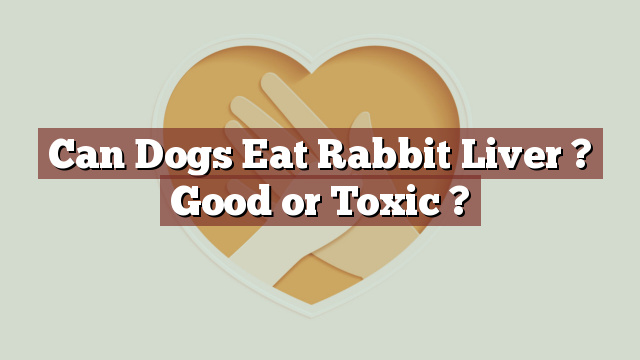Can Dogs Eat Rabbit Liver? Good or Toxic?
It is important for pet owners to be aware of what foods are safe for their dogs to consume. One food that may come to mind is rabbit liver. Can dogs eat rabbit liver? Let’s delve into this question and explore the nutritional value, safety, and potential risks and benefits of feeding dogs rabbit liver.
Nutritional Value of Rabbit Liver for Dogs
Rabbit liver is a highly nutritious food that offers several essential nutrients for dogs. It is a rich source of protein, which is crucial for muscle development and repair. Additionally, rabbit liver contains vitamins A, B12, and folate, as well as minerals such as iron and zinc. These nutrients play vital roles in supporting a dog’s overall health and well-being.
Is Rabbit Liver Safe or Toxic for Dogs?
Yes, dogs can eat rabbit liver. It is generally safe for them to consume in moderation. However, as with any new food introduced into a dog’s diet, it is important to proceed with caution. Some dogs may have specific sensitivities or allergies to certain foods, including liver. Therefore, it is recommended to monitor your dog’s reaction after feeding them rabbit liver for the first time. If any adverse symptoms occur, such as vomiting or diarrhea, cease feeding them rabbit liver and consult with a veterinarian.
Potential Risks and Benefits of Feeding Dogs Rabbit Liver
Feeding dogs rabbit liver can offer numerous benefits. As mentioned earlier, it is an excellent source of protein, vitamins, and minerals. These nutrients contribute to the overall health of dogs and can support their immune system and promote healthy skin and coat. Additionally, rabbit liver contains natural antioxidants that can help protect against cell damage caused by free radicals.
However, it is important to note that excessive consumption of liver, including rabbit liver, can lead to vitamin A toxicity in dogs. Vitamin A toxicity can cause a range of symptoms, including bone abnormalities, joint pain, and digestive issues. Therefore, it is crucial to feed rabbit liver to dogs in moderation and not as a staple part of their diet.
What to Do if Your Dog Eats Rabbit Liver
If your dog consumes rabbit liver and experiences any concerning symptoms, it is essential to take prompt action. Monitor their behavior closely and look out for signs of distress, such as vomiting, diarrhea, or abdominal pain. If these symptoms persist or worsen, it is advisable to seek veterinary assistance immediately. A vet will be able to provide appropriate guidance and treatment if necessary.
Conclusion: Considerations for Feeding Dogs Rabbit Liver
In conclusion, dogs can eat rabbit liver as a part of a balanced diet. It offers valuable nutrients and can be a healthy addition to their meals. However, it is crucial to feed rabbit liver in moderation to prevent the risk of vitamin A toxicity. Always monitor your dog’s reaction to new foods and consult with a veterinarian if you have any concerns or questions about feeding rabbit liver to your dog. By doing so, you can ensure the safety and well-being of your furry friend.
Thank you for investing your time in exploring [page_title] on Can-Eat.org. Our goal is to provide readers like you with thorough and reliable information about various dietary topics. Each article, including [page_title], stems from diligent research and a passion for understanding the nuances of our food choices. We believe that knowledge is a vital step towards making informed and healthy decisions. However, while "[page_title]" sheds light on its specific topic, it's crucial to remember that everyone's body reacts differently to foods and dietary changes. What might be beneficial for one person could have different effects on another. Before you consider integrating suggestions or insights from "[page_title]" into your diet, it's always wise to consult with a nutritionist or healthcare professional. Their specialized knowledge ensures that you're making choices best suited to your individual health needs. As you navigate [page_title], be mindful of potential allergies, intolerances, or unique dietary requirements you may have. No singular article can capture the vast diversity of human health, and individualized guidance is invaluable. The content provided in [page_title] serves as a general guide. It is not, by any means, a substitute for personalized medical or nutritional advice. Your health should always be the top priority, and professional guidance is the best path forward. In your journey towards a balanced and nutritious lifestyle, we hope that [page_title] serves as a helpful stepping stone. Remember, informed decisions lead to healthier outcomes. Thank you for trusting Can-Eat.org. Continue exploring, learning, and prioritizing your health. Cheers to a well-informed and healthier future!

